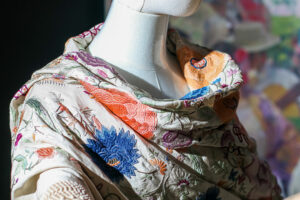MEZCLA: Interwoven Cultures and the Mantón de Manila, an exhibit at the Ayala Museum, shows off antique examples of mantóns dating from the 1800s. More than pretty shawls that you could imagine flouncing about in, each example shows the complex avenues of trade between the Spanish Empire, the Chinese Empire, and old Manila.
At the exhibit’s opening on Oct. 9, guests crowded around these examples of antique silk, painstakingly embroidered in China, brought to the Philippines, sent to Mexico, and then on to Spain. To this day, the shawls play some part in Spanish culture, seen in flamenco and jota dances, as well as at festivals.
Marinella Andrea Mina, curator and senior manager for research and publications at the Ayala Museum said that the collection is on loan from Verónica Durán Castello, who has been collecting them for the past 25 years and inherited some pieces. But due to some issues with permits regarding some of her heirloom pieces embedded with ivory, these were unfortunately not on display.
Not that anything truly felt missing: among those on view are one with Chinese motifs on a black background, a stunning one in aquamarine with bright red embroidery, while another favorite had a red background embroidered all over in white.
While the trade between empires is evident in how European motifs were adopted by some Chinese makers to appeal to their Western audience, aside from the Philippines as a pitstop, where do we appear in these?
Ms. Mina said that it was only after Mexico’s achievement of independence from Spain in 1821 that the shawls began to carry the capital city’s Manila name (“a post-Galleon phenomenon,” she calls it). As well, she says that there are indications that the fringes, another distinguishing mark of the mantóns, were always attached in Manila. According to her as well, there are some examples of openwork embroidery that might hint at Philippine participation in the making of the mantóns. She stood in front of a particular example: white silk with blue and red embroidery, which to her it appeared to have a resemblance to Southeast Asian themes seen in batik — which might hint of participation in their manufacture.
The exhibit is accompanied by the antique boxes in which these shawls, once a luxury product, were stored — and also by a couple of Juan Luna paintings depicting the shawls (Dos Buen Tipos and Chula; but not the more famous Mujer con mantón de Manila).
While we speak about the continued visibility of the mantón in Spain, Ms. Mina said, “The mantón exists in the peripheries of our studies of material culture in the Philippines.” There are those paintings, some depictions in film (e.g. Cherie Gil in Oro, Plata, Mata fleeing the fallen family’s home in a black mantón embroidered with roses), but Ms. Mina pointed out that they’re still present in our dances, such as the jota, of a different tempo than the Spanish jota, which also uses the shawls. “The mantón is there in our culture, but perhaps it’s not as prominent as you would find it in Spain,” she says.
Ms. Mina highlighted the importance of the exhibit: “It shows us the complexity of relationships, and also the evolution of culture: whether it is material culture or practice,” she said. “We are always richer by sharing our different traditions.”
The exhibition, a collaboration between the Ayala Museum, the Embassy of Spain, Instituto Cervantes, and the Spanish Agency for International Development Cooperation (AECID) runs until Feb. 22, 2026, Tuesdays to Sundays, from 11 a.m. to 7 p.m. — Joseph L. Garcia


















